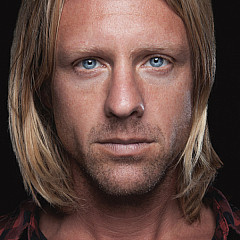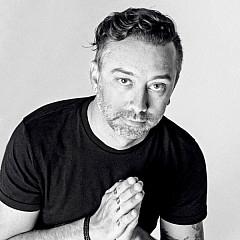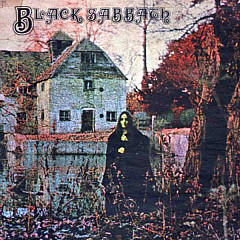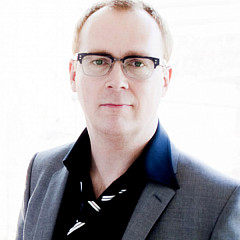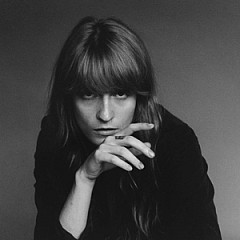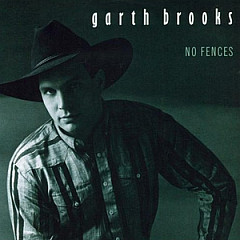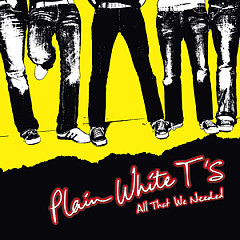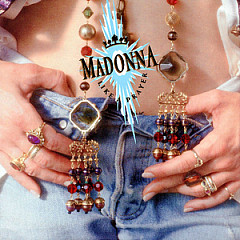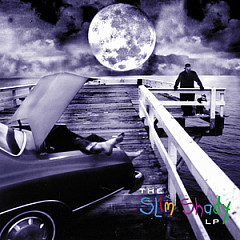Hussey has had quite a noteworthy musical career. Before they hit it big with "You Spin Me Round (Like a Record)," Wayne did a stint in Dead or Alive (led by the androgynous Pete Burns), appearing on their 1982 EP It's Been Hours Now. It was then off to the pioneering gothic rock group, The Sisters Of Mercy. He wrote half of the songs for their debut album First and Last and Always, but left in 1985, forming The Mission the following year (The Sisters have released only two more albums since, despite remaining vaguely active).
The Mission's 2013 release is The Brightest Light. It finds Hussey incorporating blues licks into his musical mojo to complement his highly developed repertoire of hard rock riffs. We caught up with Wayne on the phone from São Paulo, Brazil, which this Englishman now calls home.
 Dan MacIntosh (Songfacts): How is it in Brazil today?
Dan MacIntosh (Songfacts): How is it in Brazil today?Wayne Hussey: It's fine. It's sunny. It's a very pleasant morning. A very pleasant winter morning here. You know the seasons are reversed here. It is winter here, but it's probably nicer than Europe in the best of summer.
Songfacts: I'm in California where it's always nice. You've spent some time out here so you know.
Hussey: Yeah, I lived in L.A. for a while.
Songfacts: This interview is for Songfacts, so we're going to talk a lot about songs today. The first thing I wanted to talk about is the new album, which I really like. The opening song is "Black Cat Bone," where you talk about aging. Is that the first time where you addressed what it means to be no longer a teenage rocker?
I don't really see it as a song about that. I see it as a bit of tongue-in-cheek, actually. There are references to aging in the song and throughout the record, but I don't really see it as being an issue. "Black Cat Bone" is really me playing with blues clichés.
Songfacts: How influential has blues music been on your playing?
Hussey: I don't know if it has. The old kind of Delta blues and even some of the earlier Chicago blues I only recently got into in the last five or six years. I've obviously liked a bit of Robert Johnson, but I only delved in deeper the last couple of years. I've also been listening to Hank Williams and Marty Robbins, Johnny Cash, Bob Dylan of the '60s and very song-orientated music. I don't necessarily think it's a huge influence on my playing, but I do think it's an influence on the writing on this particular album.
Songfacts: What other things influenced the writing on this album?
Hussey: It's probably my least personal record, in many respects, because a lot of the songs aren't about me. They're a bit more outward looking than they are inward. One of the things I've never really done before, and I still haven't done it on this record, is actually write a song in the third person – put myself in the songs; even when I'm adopting a personality for that song or a persona. In the past records, my songs have tended to be more inward looking, a bit more insular. I think this one is more outward looking. There's a conscious thing on my part that I wanted to try to do something a little bit different with the writing of the songs.
You know, you can't really sit down and premeditate what you're gonna write. It just comes. But I was in the frame of mind of being more outward looking.
Songfacts: Why did you call it The Brightest Light?
Hussey: Good question. Originally, when I wrote the song, "Ain't No Prayer in the Bible Can Save Me Now," my manager George said, "Ah, that would be a great title for the album." So I kind of stuck with that as a working title through the process of recording and rehearsing and even up to having the thing mastered it was still called that. But we were struggling to find artwork that represented that title. We had a few submissions, bit it's a very long title to get across the cover of a CD, so we struggled with that.
 One day I was brainstorming with my wife about album artwork when we got stuck in a traffic jam in a tunnel. There were lots of overhead lights in the tunnel, and she whipped out her iPhone and started taking photographs of all the lights, the car lights and stuff. We have an apartment in São Paulo, and when we got back to the apartment, she started messing around with these images in Photoshop, and they looked great. It was like, wow! They looked really good because it wasn't really obvious what they were. She's not well versed in how to work Photoshop, and I wouldn't know where to start, myself. It muted a lot of the lights, so we were left with what ended up being the color. I thought, 'Oh, that's great! I like that.' That would look great on a T-shirt, on a backdrop and everything.
One day I was brainstorming with my wife about album artwork when we got stuck in a traffic jam in a tunnel. There were lots of overhead lights in the tunnel, and she whipped out her iPhone and started taking photographs of all the lights, the car lights and stuff. We have an apartment in São Paulo, and when we got back to the apartment, she started messing around with these images in Photoshop, and they looked great. It was like, wow! They looked really good because it wasn't really obvious what they were. She's not well versed in how to work Photoshop, and I wouldn't know where to start, myself. It muted a lot of the lights, so we were left with what ended up being the color. I thought, 'Oh, that's great! I like that.' That would look great on a T-shirt, on a backdrop and everything. Part of my issue with the CD covers, when you go in a CD store these days, you see the racks of new CDs, there's too much information. There's too much detail, and anything that has a lot of detail on the CD, you've gotta think, "Okay, that's gonna be reduced to iPod size for most people." So anything with too much detail will be lost. I wanted something that was simple and would work in those contexts, so we did that. And it was, like, The Brightest Light. That was already a part of one of the songs [track 3: "Sometimes The Brightest Light Comes From The Darkest Place"]. It's referred to in a couple of the lyrics on the album as well. So, that is what it became. It was a happy accident.
Songfacts: How cool. I love it when that happens.
Hussey: Me, too. We were certainly floundering for a bit there. We were thinking about, "There Ain't Any Prayer in the Bible that can Save Me Now." I liked the title, but didn't know how we were going to get that across without being obvious, and a lot of the artwork that was submitted for consideration was very literal - "No, you're not getting it." So that's how we came up with the title.
Then the second time was a couple years later when I was in The Sisters and we were looking for producers for the first album. Dave was suggested to us and I think he'd just started working with The Cure at that point, who were in a vaguely similar genre. I said, "Yeah, I know Dave, he's great," so we did that album together. He and I got on great. He had a tough job making that record because of tension within the band, shall we say. There's some great stuff on that record.
I wanted to use Dave again with The Mission back in 1989. We were doing a single and I wanted to use Dave again but the record company said "no." I had a huge fight with them. They got their way, of course.
Then he mixed half of the Aura album, back in 2000 or 2001. And then when it came to this record, I knew I didn't want to produce it; I wanted to concentrate on my position as a member of the band. The last few records I produced. You know, it's quite a lot of responsibility, really, to be sitting there as the guitarist, the songwriter and the producer. There are a lot of balls to keep juggling. So, we talked about it and there were a few names thrown into the hat and both Craig and I knew Dave from working with him before. I just really liked him. I knew I would be comfortable. I knew he would get what we wanted him to do, and he wasn't a young kid that would come in and try to impose his own personality on it, which I was really wary of.
I don't want to sound too old, but we've made a few records. We know what kind of record we want to make. I didn't want to make a modern rock record. I didn't want that modern Pro Tools drum sound and all that kind of stuff. I didn't want to make one of those kind of records, and I knew Dave would get that. I knew Dave would be sympathetic to that.
One of the great things about Dave is that he's very good at management. I think he recognized the roles that each of us had to play in this record and he really bent his personality to each of us when he was dealing with us. That, to me, is an essential part of being a good producer: being able to communicate and get the best out of the individual musicians.
Floodland was partially produced by Jim Steinman, best known for his work on Meat Loaf's Bat Out of Hell.
Hussey: It's all perpetuated by people like you asking the question, isn't it? You know, it's part of our past. But bloody hell, it's 27 years of The Mission! How many jobs that you were doing 27 years ago do you still talk about? Very few. The thing about The Sisters was it was a great time. We made a good album. I'm proud of that time. It's already been well documented, so we don't really need to talk about that. Craig [Adams] and I came from that band, but we've been doing The Mission now off and on for 27 years. It is unfortunate that we still end up having to come up against this one. As you said, The Sisters have released very few records, and I think on Andrew's [Eldritch] part, he's managed that very well. He still maintains his self-ness and his audience, you know. I think if Andrew was to make a record it would actually blow his whole thing, so I think he knows that. I'm a musician. I write a song. I want to record it. I want to get it out and move on to the next thing.
Songfacts: Well, can I ask you just one question about Sisters Of Mercy? And then we'll move on. As far as your recorded work with them, songs that you helped create, what are you most proud of?
Hussey: That would have to be "Marian." Andrew and I worked at different times of the day in the studio. I would work during the day, which is why poor old Dave was absolutely exhausted by the end of it: because he was trying to work with both of us. "Marian" was something I came up with in the studio and there I wrote the whole song, music and the backing track. I wrote "Black Planet" the same day, actually. Then Andrew came in in the evening:"Oh, I don't like that." I was, like, whatever. I went off. I came back in the morning and there were finished vocals on both of them. That was how it was working on the album.
I had an occasion to listen to "Marian" about a year or so ago because I was doing a DJ set. I thought, 'Oh, I'll play Sisters.' So I got "Marian" out and listened to it. There's a weird alchemy at work on that track with the guitars. I can't remember what I played or what guitars I played, but the combination, the mixture of the guitars on that song has some weird alchemy at work. It sounds really spacious, but very full.
Songfacts: Well, let me ask you the same question regarding The Mission. The song I really like is "Wasteland," but do you have any favorite moments with The Mission over the many years that you've been creating songs for that band?
Hussey: You know, it's a funny thing being a musician because I don't know if other musicians feel like this because there are very few records we've made, very few tracks we've recorded to my ears that sound like a proper record. I don't know if you can understand that. When I hear them, all I can hear is maybe how it could have been better.
Songfacts: Really?
Hussey: It's a weird thing. I mean, obviously, like most musicians I'm closer to the new album than anything else. But only time will tell where it stands in the canon. If I were to pick one song, it would be "Tower of Strength."
Songfacts: And what is it that you like so much about that?
Hussey: I think it's a celebration of our relationship with our audience. It's big. It's pompous. It's grandiose. It's melodramatic. It's everything the band were at the time and it's a song, even now when we play it live, there's still a great communal to and fro between us and the audience. So it has that about it. I still get a kick out of performing it.
Songfacts: I was reading in your bio about the camaraderie of having pretty much the original players intact. How important is camaraderie to the success of a band?
Hussey: Every band is different. I hear of friends of mine in bands that travel separately, have separate dressing rooms and the only time they meet is when they're on stage. If that's how it works for them then that's how it works for them and it's fine. With us, we're unfortunately not in a financial position to be able to do that. We have to travel together, so we need to be able to get on at least a little bit.
The thing about it is we're all a lot older. We're hopefully a little wiser. We're certainly more mellow. We all realize this is really a great opportunity for us to be able to do this at this stage in our lives. Whilst I wouldn't say we're the best of friends, we get on very, very well. And I think there's a very, very deep affection and respect for each other, but we don't live in each other's pockets, even when we're on tour. I live in Brazil. Craig lives in the U.S. and Simon [Hinkler] lives in Devon, in the UK. So we're all scattered around. The only time we really get together is when we have things to do. That's fine.
And another thing was we decided when we got back together was that we weren't going to overdo it, so we only ever do things that maybe last two and a half, three weeks; four weeks at the very most. So that's not time enough to get sick of each other.
Songfacts: That almost answers my next question: What is the key to remaining a band for so long and have such a long success?
Hussey: I think as a musician I've tried to be as honest as I can. Certainly more so in the later years. In the early days of The Mission I was caught up in the idea of being a rock star, but that soon blows over. I think the audience realizes there is a degree of integrity, honesty. I certainly feel like with this record we've made an honest record. It's not tried to be anything other than what it is. Hopefully, our audience will recognize that. Maybe that's the key to our longevity. I certainly don't think it's hats and haircuts.
Songfacts: I've never seen you as The Mission, but I did see Sisters Of Mercy one time. This was at The Palace in the '80s. You were using so much fog that I could hardly see the band.
Hussey: That's okay because we were really ugly.
September 5, 2013
More Songwriter Interviews

